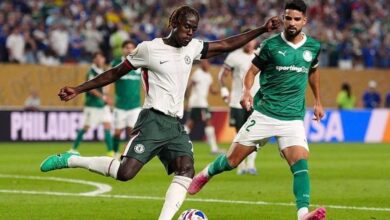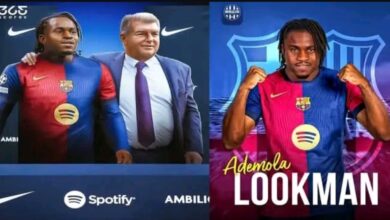BOMBSHELL 🔴Marc Cucurella announces boycott of Pride Month: “Pride is not about celebration—it’s about being sober and boycotting the culture that’s being imposed on our children

Marc Cucurella Sparks Intense Debate After Announcing Boycott of Pride Month
In an unexpected and highly divisive development, Spanish footballer Marc Cucurella, who currently plays in the English Premier League, has publicly declared his decision to abstain from participating in Pride Month activities. The footballer made this announcement via his personal social media accounts, instantly triggering a wave of heated discussions and emotional reactions across various communities. Many fans, observers, and commentators expressed deep surprise and disappointment, questioning the motivations behind his stance. In his statement, Cucurella asserted that, in his opinion, “Pride is not about celebration—it’s about being sober and boycotting the culture that’s being imposed on our children.” His words have not only drawn widespread attention but have also stirred significant controversy within the global sporting arena and beyond.
Examining Cucurella’s Views: What Is He Trying to Communicate?
According to Cucurella, his decision to boycott Pride Month stems from a growing discomfort with what he perceives as the evolution of Pride from a simple celebration of diversity and inclusion into an event that, in his view, promotes specific ideologies, especially concerning gender identity and sexuality. He elaborated that his opposition does not target the LGBTQ+ community itself, but rather focuses on his belief that certain cultural narratives are increasingly being directed at children in ways he finds troubling.
In his message, Cucurella expressed his concern that Pride Month has shifted away from being a platform for acceptance and visibility toward becoming an influential force that might shape young minds in ways he believes are inappropriate. He emphasized that his boycott should not be interpreted as an act of hatred or discrimination, but rather as a personal stand for what he sees as preserving the innocence of children and advocating for alternative perspectives. Nevertheless, given the sensitive nature of Pride Month and its significance as a symbol of LGBTQ+ visibility and advocacy, many individuals have interpreted his words as a direct challenge to the LGBTQ+ rights movement and the broader fight for equality.
Public Response: A Polarized Reaction from Supporters and Opponents
Marc Cucurella’s announcement has sharply divided public opinion, sparking intense debates across social media platforms, news outlets, and within the football community itself. On one side, a segment of supporters has commended Cucurella for having the courage to openly share his personal beliefs, especially on a subject as emotionally charged as Pride. These supporters argue that while his views may not align with prevailing social trends, freedom of expression should allow individuals like Cucurella to voice differing opinions without fear of backlash. Some have further claimed that Pride Month celebrations have, over time, become increasingly politicized, moving beyond their original intent of promoting equality and acceptance.
Conversely, a substantial number of critics have voiced strong condemnation of Cucurella’s comments. Many fans, LGBTQ+ activists, and even fellow professional athletes have expressed outrage, accusing the footballer of undermining years of progress made in the struggle for LGBTQ+ rights. These critics argue that Pride Month continues to serve as an essential platform for raising awareness about the ongoing discrimination, marginalization, and violence that LGBTQ+ individuals continue to face globally. They fear that Cucurella’s stance not only contributes to existing stigma but may also embolden those who harbor anti-LGBTQ+ sentiments, thereby fueling further division and hostility.
Prominent LGBTQ+ organizations have also weighed in on the matter, underscoring that Pride is not merely about celebration, but serves as an important movement to draw attention to the challenges, hardships, and inequalities that members of the community still endure. These organizations have described Cucurella’s remarks as both harmful and divisive, emphasizing that dismissing or boycotting Pride risks silencing voices that are already vulnerable and marginalized.
Potential Consequences: The Impact on Cucurella’s Career and Reputation
Given the highly public nature of his statement, Marc Cucurella may face far-reaching consequences that could affect his professional career and public image. Although professional football has historically lagged behind other sectors in embracing open conversations about LGBTQ+ issues, recent years have seen a significant push towards fostering greater inclusivity and diversity within the sport. Campaigns such as “Football v Homophobia” and the growing presence of openly LGBTQ+ athletes have helped bring these conversations to the forefront.
Cucurella’s outspoken position may strain his relationships within the football community, both with supporters and his club organization. While some individuals may view his decision as a brave act of standing by his principles, others may perceive his views as being misaligned with the modern values of tolerance, respect, and inclusivity that many football organizations and fan bases are striving to promote. His remarks could potentially influence sponsorship opportunities, brand endorsements, and collaborations, as corporations and organizations increasingly prioritize aligning with socially progressive values. Moreover, how his stance affects his relationships with teammates, club management, and the broader footballing community remains uncertain as the situation continues to unfold.
Conclusion: A Statement with Far-Reaching Implications
Marc Cucurella’s decision to publicly oppose Pride Month and articulate his reasons for doing so has ignited a passionate and multifaceted debate concerning the delicate balance between personal freedom of expression and social responsibility. While there are individuals who resonate with his concerns and defend his right to express his personal convictions, there is a significant outcry from those who view his remarks as contributing to ongoing struggles for equality and acceptance within the LGBTQ+ community.
This controversy reflects larger societal tensions surrounding cultural debates, individual rights, freedom of speech, and the ongoing push for greater inclusivity and diversity. As discussions around Cucurella’s statement continue to evolve, it remains to be seen how these events will ultimately shape his future — both personally and professionally. Regardless of the eventual outcome, it is clear that his comments have brought renewed attention to some of the most challenging and sensitive social conversations of our time.



